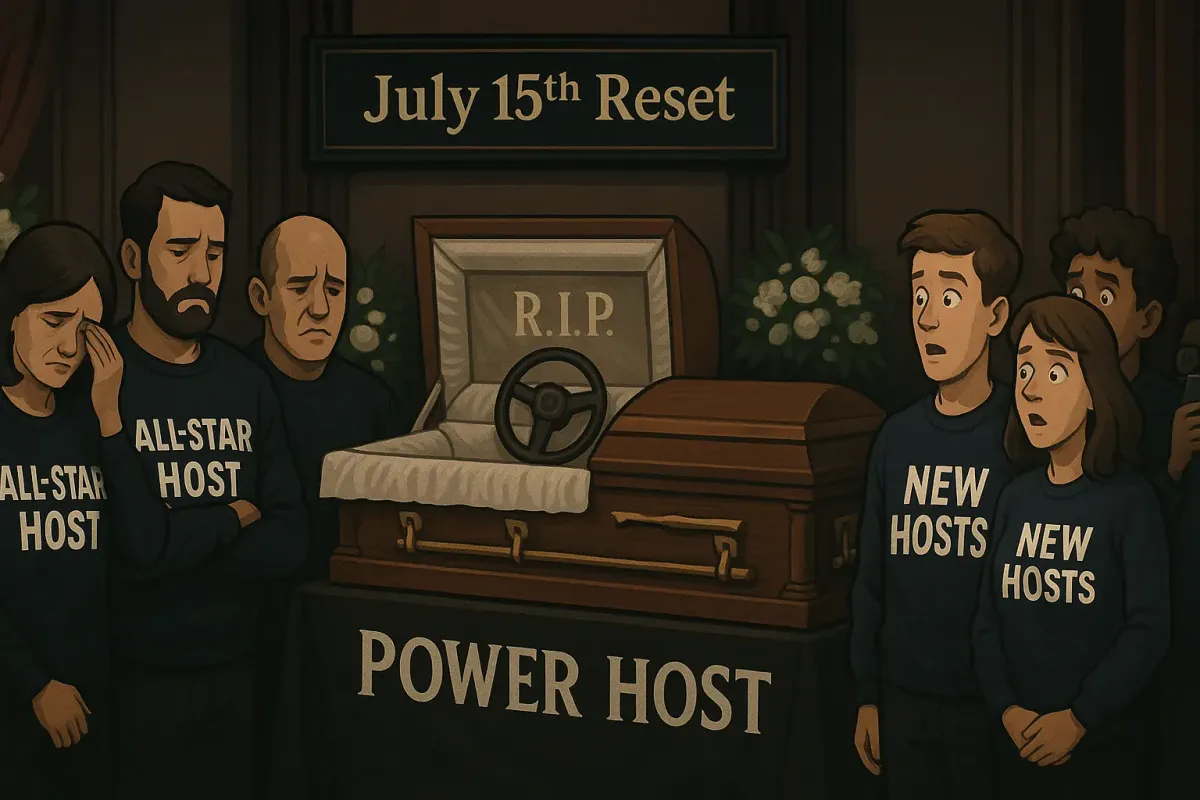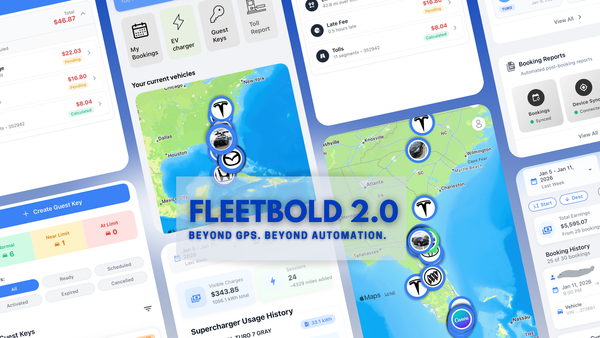Power Host? Not Anymore. And the Reason Makes No Sense
July 15, 2025 redefined what it means to be a top host on Turo. While some celebrated reaching Power Host status, others saw their rank slip many for reasons they consider unfair. Here's a deep look into what’s really going on.

July 15, 2025: The Day the Power Host Line Was Redrawn
For many Turo hosts, July 15 wasn’t just another day. It marked a major quarterly reset of All-Star and Power Host status. Some hosts saw their ranking quietly disappear, others held on by a thread, and a few new names appeared on the list. But behind every number is a story and not all of them reflect real quality or effort.
Let’s unpack who lost, who stayed, and who climbed and why many hosts are questioning how the system is being measured.
Who Lost Power Host Status: Large Fleets, Unfairly Penalized
Hosts managing over 30 vehicles were among the hardest hit in this reset. These are the operators who’ve built full businesses around Turo automating check-ins, streamlining maintenance, and delivering consistent guest experiences at scale. Ironically, those strengths are now working against them.
Why?
Because Turo’s current system treats unrated trips almost like bad reviews. If a guest doesn’t leave feedback, the system assumes the experience was subpar. Accumulate too many of these and your host score drops or worse, your vehicles start getting flagged for deactivation.
The real issue? No review doesn’t mean the guest was unhappy. In fact, for high-volume fleets, it’s often just part of the game. Many guests complete the trip without issue and simply never open the app again.
Hosts with 30+ cars don’t have the bandwidth to manually follow up after every trip or monitor which guests left feedback. The system demands both scale and micromanagement and that combination just doesn’t add up for those running professional fleets.
Who Maintained Status: Small Fleets with Big Effort
Some hosts with 5–15 cars managed to keep their Power Host or All-Star badge—but it came at a cost.
These hosts often had to increase staff, take on deliveries themselves, and go back to more personal handoffs things they hadn’t done in months. Others added welcome kits, printed guides, snacks, or more aggressive follow-up just to protect their rating.
In other words: they didn't just host, they hustled.
But even then, every 4-star or no-review trip put their status at risk. One host described it like this:
“You feel like your entire month can be undone by someone who just didn’t bother to leave feedback.”
Who Gained Status: Mid-Size Fleets Going All-In
Interestingly, many of the new Power Hosts this quarter aren’t beginners. They tend to have between 5 and 10 cars, and they’ve gone all-in on service.
These hosts are obsessing over the guest experience: water bottles, phone holders, fresh wipes, detailed notes, even post-trip thank-you texts. They’re not running full fleets yet, so they have just enough bandwidth to make every trip feel premium.
And it’s working for now. But many are already wondering how sustainable it is. Will they still be able to provide that level of personal attention when they grow to 20 or 30+ cars? Or will they eventually face the same issues larger fleets are dealing with now?
The Flawed Logic Behind “No Review = Bad Review”
At the heart of the current frustration is one controversial idea: that a trip without a guest review should count as a negative experience.
Most hosts argue this makes no sense. And they’re not wrong. Here are a few reasons why a guest might not leave a review:
- They’re not the reviewing type. Not everyone reviews every app or service they use.
- They forgot. Even satisfied guests often miss the review window or plan to do it later and never do.
- They’re confused. Recently, more hosts report guests asking where to leave a review, saying they can’t find the button.
- Technical glitches. The prompt might disappear or not show up at all.
- They didn’t think it mattered. If the experience was smooth and expected, they may not feel it deserves extra comment.
- They’re hiding something. In rare cases, guests who broke a rule (smoking, late returns, etc.) may avoid leaving a review to not trigger host retaliation.
The idea that “no review = bad experience” feels like a shortcut Turo’s algorithm is taking and it’s one that punishes hosts unfairly.
What This Means for the Future of Hosting
The July 15 reshuffle exposed a deeper issue in how success is being measured on Turo. Right now, the platform rewards hosts who can provide 5-star personal service on every trip but that model isn’t scalable. It penalizes automation and growth. And it pushes even professional operators into micromanaging every detail just to protect their score.
If the platform wants to encourage serious hosts to stay and grow, it may need to rethink how it measures quality. Otherwise, it risks becoming a game where only those with time for 10 cars or less can play at the top levels.
Conclusion: A Shift Worth Watching
The Power Host badge still matters. It boosts visibility, signals trust, and opens up opportunities for preferred support. But July 15 showed that earning and keeping it now comes with new challenges.
Hosts will adapt because that’s what they’ve always done. But Turo has a chance here to improve its system, recognize sustainable quality, and build something that works for both new hosts and those operating at scale.
Let’s hope it listens.
FAQ
Q: Why did I lose my Power Host status on July 15, 2025?
A: Most likely due to ratings, unrated trips, or total earnings not meeting the latest quarterly threshold. Unrated trips are now counted against your score in some cases.
Q: Can a no-review trip really hurt my performance?
A: Yes. Turo often interprets no review as a sign of a poor experience. Too many of these can bring down your host rating or trigger vehicle delisting.
Q: How can I increase my review rate?
A: Many hosts send a friendly follow-up message asking guests to leave a review. Others add small touches (like water bottles or thank-you notes) to boost the chance of a 5-star rating.
Q: Is it still worth aiming for Power Host status?
A: It depends on your goals. If visibility and support are important to you, yes—but it does take more effort than before, especially with larger fleets.





